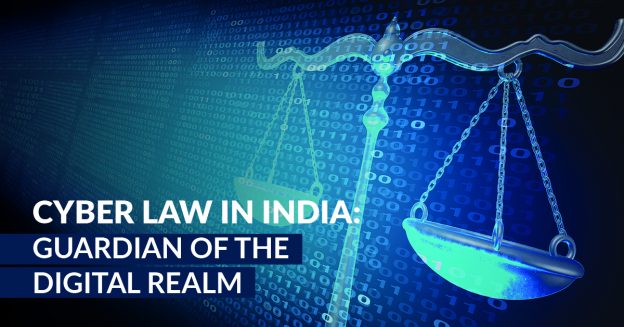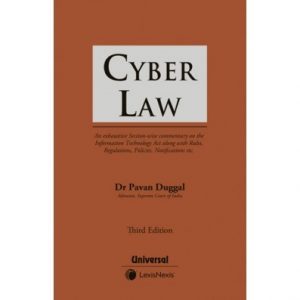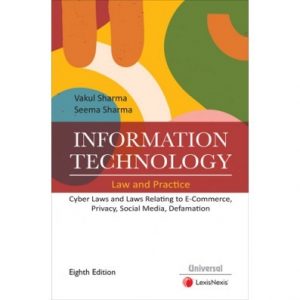Cyber Law in India: Guardian of The Digital Realm

In this digital and technology paced age, where Artificial Intelligence and Technology plays a significant role in our daily lives, there is a growing necessity of establishing laws to regulate the online world. As India moves forward in adopting technologies towards its’s realisation of the “Digital India” scheme, there is requirement of robust legal measures and frameworks to safeguard individuals, enterprises and the nation from the diverse risks that come with the digital age. In this blog, we will be discussing cybercrimes, cyber laws – its types, importance and objectives with a tabular differentiation between cybercrimes and cybersecurity.
Cybercrimes and types of cybercrimes
Cybercrime involves unlawful human actions conducted through computers, networks and/or the internet. These illegal activities can be aimed at individuals, businesses or governmental bodies with the goal of causing system disruptions obtaining data or engaging in schemes. There are numerous crimes associated in the cyber world, like: –
Breach of Cybersecurity:
A breach incident in cybersecurity occurs when an individual or organisation obtains unauthorized access, to computer systems or networks and such unauthorised access leads to data theft or operational disruptions. These incidents encompass a variety of forms such, as data breaches, ransomware attacks, cyber terrorism and supply chain infiltrations.
Cyber Threats:
Cyber threats refer to the illegal acts of hackers whose primary goals are to disrupt the computer network, harm the computer systems and/ or engage in malpractices on those devices. Examples include, but are not limited to Trojan attacks, Advanced Persistent threats (ATPs), phishing activities like fraudulent emails and messaging to trick individuals.
Digital Content Offenses and Cyberbullying & Harassment:
This category encompasses the creation or distribution of hateful content online. Digital content offenses include a wide range of activities, including, but not limited to identity theft, cyberbullying, phishing, child pornography, cyberstalking, morphing, hate speech and others. The Information Technology Act (IT Act) and the Indian Penal Code have specified punishment for each of such types of terrible acts.
Fraudulent Activities in the Cyberspace:
Credit card, OTP scams have taken over the world. These involve deceiving individuals or organizations, with the intention of obtaining electronic signatures, money or personal information. This also includes identity theft, investment frauds and Aadhar card frauds are on the rise in India.
What is Cyber Law?
Cyber law or information technology law involves studying matters related to using the internet electronic devices, for communication and computer networks. This field addresses topics such as agreements, digital crimes, data protection, privacy rights, jurisdiction in cyberspace and legal principles in the digital realm. Its significance lies in safeguarding the rights of people and businesses to maintain a trustworthy online space.
Cyber Law in India
In the age of India’s rapid development, cyber law has become an essential aspect of the legal framework. It covers a range of legal matters in the digital realm related to the use of electronic devices, computer networks and the increased use of social media. It plays an important role in protecting the rights of individuals and organizations in the world ensuring a safe and reliable online environment.
Information Technology Act, 2000 (IT Act):
The IT Act in India serves as the foundation of cyber law and covers types of cybercrimes, imposes punishments for crimes involving unauthorized accessing into computer systems stealing data, hacking, cyberterrorism and spreading inappropriate or offensive material on the internet.
The Digital Personal Data Protection Act, 2023 (DPDPA):
DPDPA focuses on regulating data collection, processing, storage and usage while bolstering privacy safeguards with an emphasis on securing minor consent through the permission of guardian.
Measures pertaining Cybersecurity
India has made huge strides in cybersecurity by establishing the National Cyber Coordination Centre (NCSC) and the Indian Computer Emergency Response Team (CERT In) to combat cyber threats, data breaches and to improve cybersecurity resilience. The IT Act mandates companies and organisations to report data breaches within a 6-hour window of noticing such data breach to CERT In for investigation and response to cyber-attack.
Cybercrime Investigation:
Specialized cyber cell units within the police force have been set up specifically for investigating and prosecuting cybercrimes efficiently. The Digital India Initiative by the Government needs to be applauded for the sound implementation of this initiative.
Importance of Cyber Law
The field of cyber law plays a very crucial role, in today’s digital era. Its significance arises from the increasing reliance on internet and computer networks across various aspects of our everyday lives ranging from personal interactions to businesses. The importance is highlighted below: –
Preserving Individual Rights: Cyber law serves to safeguard rights such as privacy, identity and property within the realm of the world. It helps to block entry to data, safeguards against cyberbullying and dangers online and secures intellectual assets from being violated.
Fighting Cybercrime: Cyber Laws are preventive and protective regulations pertaining to cyberspace crimes. They set out punishments for crimes such as hacking, phishing, data and identity theft, cyberbullying and online fraud. These laws also outline procedures for catching and punishing criminals and hence are aimed to prevent unlawful activities and hold individuals accountable for their wrongful actions.
Strengthening Cybersecurity: Within the domain of cyber law lie frameworks that aim to protect infrastructure encompassing computer networks, data storage systems and online services. It mandates cybersecurity measures, promotes secure practices and facilitates cooperation in combating cyber threats. Examples are Computer Emergency Response Team (CERT-In) Directions to protect data theft.
Types of Cyber Laws
Cybercrimes laws:
The Information Technology Act addresses types of crimes such, as hacking into computer systems spoofing, altering source documents sharing content cyber stalking and more. These offenses are categorized as cybercrimes against individuals and cybercrimes, against property.
Cybersecurity laws:
Cybersecurity primarily aims to safeguard systems such, as computer networks, data storage platforms and internet services against cyber threats. Legal guidelines and regulations in cyber law provide the foundation for enforcing strategies like incident response plans such, as those outlined in the IT (The Indian Computer Emergency Response Team) Rules of 2013.
Data Privacy and Protection:
Data protection involves the management of data, how it is gathered, stored, utilized and transferred globally. Cyber law oversees these operations by setting out rules to safeguard the confidentiality and integrity of details. The Digital Personal Data Protection Act of 2023 (DPDPA), along with the IT (Reasonable Security Practices and Procedures and Sensitive Personal Data or Information) Rules, from 2011 (SPDI rules) are aimed at safeguarding individuals’ privacy and preventing access or misuse of their information. The notion of “Consent” holds importance in this context.
Objectives of Cyber Law
Cyber law has numerous objectives all with the purpose of establishing an environment that is safe secure and reliable, for individuals, organizations and nations. Few advantages of cyber law and its objectives have been enumerated below: –
Preserving Privacy: Cyber law ensures that individuals privacy rights are protected in the world by ensuring collection, storage and proper processing of personal data.
Shielding Identity: Cyber law acts as a safeguard for Individuals identities by preventing unlawful access, theft or misuse of identity. This protection helps prevent impersonation and identity fraud.
Preventing Cybercrime: Cyber law defines boundaries and penalties, for cybercrimes. By doing it discourages individuals from participating in malicious and unlawful activities online.
Difference between Cybercrime and Cybersecurity
| BASIS | CYBERCRIME | CYBERSECURITY |
| Definition | Commission of illegal activities through use of computer networks and programs. | Protection of computer systems and networks from malicious digital activities. |
| Focus On | Exploitation, harms towards Individuals, property and government. | Security, prevention and protection of harmful activities. |
| Legal Framework | IT Act, Criminal laws, Contracts | IT Act, Data Protection Laws |
| Objectives | Deterring crimes, protection of individuals, and to impose punishments on offenders. | Protection of assets and information, incident response plans and to minimise data attacks. |
| Examples | IT Act, IPC that is going to be Bharatiya Nyaya Sanhita from 1st July. | IPC that is going to be Bharatiya Nyaya Sanhita from 1st July, CERT-IN Rules, The Digital Personal Data Protection Act. |
How to protect yourself on the Internet?
1. Use Anti-virus software- Antivirus programs are designed to identify and eliminate suspicious software that can pose a threat, to your device and compromise its security. It’s important to scan your devices for viruses and malware to ensure that they remain safeguarded.
2. Use strong passwords and 2 factor authentications: It’s very necessary to prioritize passwords and multi factor authentication to protect your accounts from unauthorized access. Avoid using information such, as birthdays, names or common words, in your passwords. Instead opt for a combination of upper- and lower-case letters, numbers and symbols to create strong unbreakable passwords.
3. Be cautious of sharing information and the content you post: Phishing scams are frequently utilized by cybercriminals to deceive people into exposing information or clicking on links. It’s important to be cautious of emails those containing attachments or links. Limit the amount of information you share online on social media platforms. Refrain, from disclosing details such, as your home address or phone number.
Books to Gain More Knowledge
“Cyber Law” by Dr Pavan Duggal

This in-depth commentary provides a clear and concise knowledge of the Information Technology Act, 2000 (IT Act). The commentary discusses a range of subjects including the guidelines, rules, policies and notifications established within the Act. Over the years we have seen remarkable advancements in cyber law principles. The field of Cyber law has advanced swiftly and developed dynamically. Subsequently, the commentary aims to explore, dissect and assess numerous sections of Cyber law present in India and how they relate to various human’s actions.
“Information Technology Law and Practice” by Vakul Sharma and Seema Sharma

This eighth edition of Information Technology: Law and Practice is a treasure trove of section-wise commentary that captures the journey of the Act. It has a lucid language with concept notes, illustration, anecdotes, and diagrams. It contains landmark judgments related to Privacy, Freedom of Speech and Expression, Defamation, Child Pornography, and so on. It also contains comparative analysis of related provisions in different jurisdictions to get an overview of the subject.
“Computers, Internet, and New Technology Laws” by Karnika Seth

This comprehensive resource is an explainer on all the latest national and international regulations, case laws, concept notes and emerging trends that have shaped the digital laws realm. The book revolves around the emerging crimes such as phishing, online trolling sexting, and revenge porn. The resource is dynamic and will empower a wide range of readers including judges, legal professionals, privacy individuals, cyber-crime lawyers, IT-ITES Experts, international organisations and companies and will help them gain practical guidance.
Conclusion
As the digital world continues to evolve, cyber laws have a huge impact in protecting the rights, security of individual’s organizations and nations. The objective of cyber law is diverse including safeguarding rights as well as deterring and prosecuting cybercrime. The IT Act has been instrumental in addressing the emerging challenges posed by cyber threats and stands as a testament to the Digital India Scheme while also promoting a safe digital environment within our country. Therefore, cyber law stands as a foundation in the digital realm by providing a legal framework to tackle the complex challenges and opportunities that arise from the ever-dynamic technological landscape.
FAQs
- How many cyber laws are there in India?
There are 2 key legislations- Information Technology (IT) Act, 2002 and the Digital Personal Data Protection Act (DPDPA), 2023
- What is meant by cyber law?
It is a field of law which caters to the growing needs of the digital world and governs computer networks and programs.
- Who is the father of cyber security?
Bob Thomas
- Which is the main cyber law in India?
The Information Technology (IT) Act, 2002
- Who introduced cyber law in India?
Department of Electronics and after that Ministry of Information Technology (IT)
- What are the cyber law examples?
Information Technology (IT) Act, Computer Emergency Response Team (CERT-In) Directions

